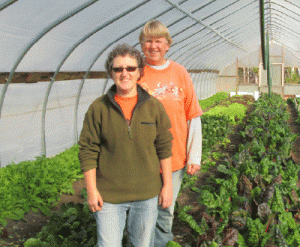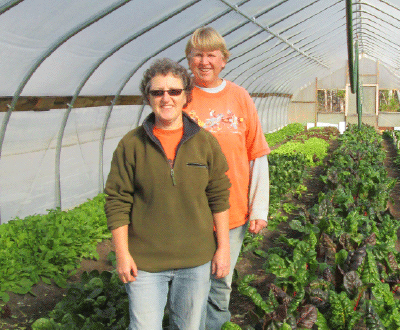by Lydia Johnson, CFSA intern

Debbie and Audrey showing off their vibrant Swiss chard in one of their hoophouses.
Photo by Lydia Johnson.
When they bought a home tucked in the back of a residential subdivision about five miles outside of historic Hillsborough, NC, Audrey Lin and Debbie Donnald never imagined that full-time farming would be in their future. Audrey and Debbie moved to their 10-acre property in 2005 to be closer to Debbie’s family. Establishing a garden was a high priority for the avid organic gardeners, but after Audrey lost her job in 2009, they ramped up production, invested in additional infrastructure, and launched Two Chicks Farm .
Year-round Bounty
Transitioning their enterprise from hobby garden to a farm-and-food business has been a gradual process. The first steps involved clearing dead trees and prepping the land to plant crops. Some areas of the wooded property have drainage problems, so Audrey and Debbie have been strategic about the placement of their growing plots. With 5 acres surrounded by deer fencing, 1.5 acres are currently in vegetable production. Audrey built the first hoop house on the land in 2010, but they soon realized that the 20’x48’ single-layer plastic structure was too limiting. After modifying the original hoop house and adding two additional ones, Two Chicks Farm now boasts three 20’x96’ hoop houses with double-layer plastic and forced air to further raise the temperature inside during winter, allowing them to grow crops year-round.
Every plant on Two Chicks Farm is started from seed using soil blocks. Transplants then take root in one of the three hoop houses or two uncovered plots. The trio of hoop houses are the secret to Two Chicks Farm’s year-round growing success, allowing them to grow early tomatoes, cucumbers, peppers, as well as beets and carrots for early spring. During the summer, they use shade cloth to protect the arugula, lettuce and ginger growing inside the hoop houses. Through the cool season, crops like Swiss chard, carrots, beets, parsley, hakurei turnips, baby greens, radishes and even potatoes flourish.
This season, Debbie and Audrey have one new field in production and they plan to continue increasing the variety of crops grown on the farm. The original garden plot hosted rows of kale, beets, carrots, daikon radishes, cabbage and garlic. Much of the plot was also planted with winter cover crops such as crimson clover, hairy vetch, winter rye and winter peas. In the second field where production began this year, cabbage, beets, and four rows of their market sensation Brussels sprouts were going strong. Remnants of the summer’s pepper crops are still visible on the new field but only a barren patch remained where the sweet potatoes once grew.
Moment of Conversion
While living in Austin, Texas, Audrey and Debbie claim they were “converted” to organics in the midst of constant conversations about the hazardous environmental impacts of conventional farming methods. This convinced them to abandon the synthetic pesticides and fertilizers they had been using in their garden. Once they stopped, these future organic farmers witnessed a dramatic return of creatures in and around the garden, birds circling overhead, worms and grubs happily revived and the soil improved dramatically through the use of compost. They call it their “Aha!” moment. Since then, they haven’t looked back. Commenting on their farming philosophy, Debbie explained, “We try to do everything we can to make this better than when we got here.”
You can sense this mindfulness all around the farm. Keeping a damper on pests and disease is a labor-intensive process at Two Chicks Farm, involving a combination of creative problem solving and dogged persistence. In the enclosed space of the hoop houses where birds cannot prey upon pests, Audrey and Debbie release ladybugs to control the aphid population. Other tactics include foliar feeding with seaweed and fish emulsion, crop rotation and hand-killing insects. Succession planting helps quell the threat of disease in the cucumber crop and no squash or melons are grown on the farm in order to prevent squash bugs from transferring to other plants. Even constant attention won’t always do the trick; this year a massive invasion of armyworms took out an entire row of beets. Aiming not to harm beneficials like bees and praying mantises, they use insecticidal soap and Bacillus thuringiensis (Bt) as sparingly as possible.
In addition to the hoop houses, Debbie credits soil amendments for their robust, year-round bounty. She and Audrey put in alfalfa meal, kelp, compost, and leaves to stimulate microbial activity in the soil. They consciously decided against using any manure for fertilizer due to concern about increasing zinc levels in the soil and instead use only plant-based fertilizers on the farm.
Fermented Foods Too
Two Chicks Farm provide a steady and varied flow of produce for shoppers at the South Durham, Eno River and Western Wake Farmers’ Markets. However, they are probably best known for their preserved vegetables on sale at the markets, as well as through local retail outlets like Bull Street Gourmet & Market in Durham and The Depot in Hillsborough. In addition to an assortment of pickles and several varieties of pepper jelly, they prepare lacto-fermented products such as sauerkraut, cortido, kimchi, sauerruben and seasonal specialties like carrot pickles, sour beets or ginger carrots. Audrey’s passion for lacto-fermentation grew through a course with the acclaimed Wild Fermentation author Sandor Katz. Preserving food that might otherwise be turned down by market customers is part of Two Chicks Farm’s creative farm-and-food business plan. She summed it up, saying, “Either it’s gonna go in a jar or we’re gonna sell it.”
Lydia Johnson, a CFSA intern, is working on a Master’s degree at the UNC School of Social Work.


